Launchpad : How to Build an HEC Startup ?
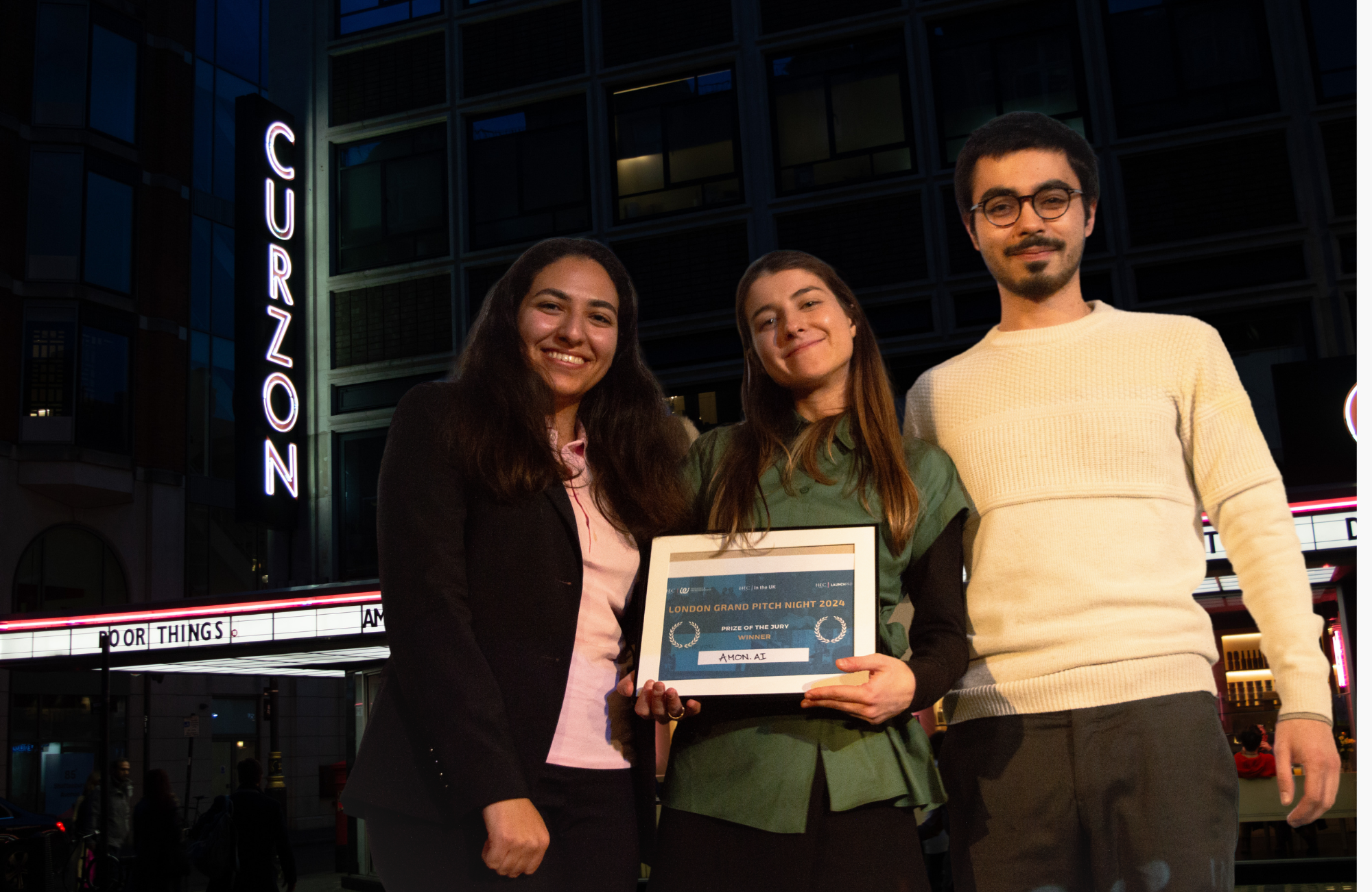
Last Wednesday, the HEC Launchpad program held a pitch competition in grand style at the Curzon Theater in the Soho district of London. With the support of the HEC UK House, the ninth edition of this Grand Pitch Night 2024 is a key step in this course built to guide future entrepreneurs, from psychology workshops to meetings with investors. Who are the new talents ? What are their projects? Here is a backstage report of a major event in the HEC entrepreneurial ecosystem.
The participants of the HEC Paris Startup Launchpad landed in London on Monday, March 18, but these 125 students have been diligently working since January. It’s difficult to fit everyone in the HEC UK House lobby for a group photo. HEC stories mingled with a crowd from which all kinds of languages can be heard. Indeed, this international program partnered with NYU Stern and ESA Business School.
The promise of the Launchpad? Buildi a startup in just eleven weeks. With a total of 144 participants for 2024, this format has been accompanying entrepreneurs in the making since 2015. Candidates are selected based on their application and validated by a jury. Methodology, fieldwork, access to a network of business leaders and mentors… These intense weeks are punctuated by highly anticipated pitch competitions.
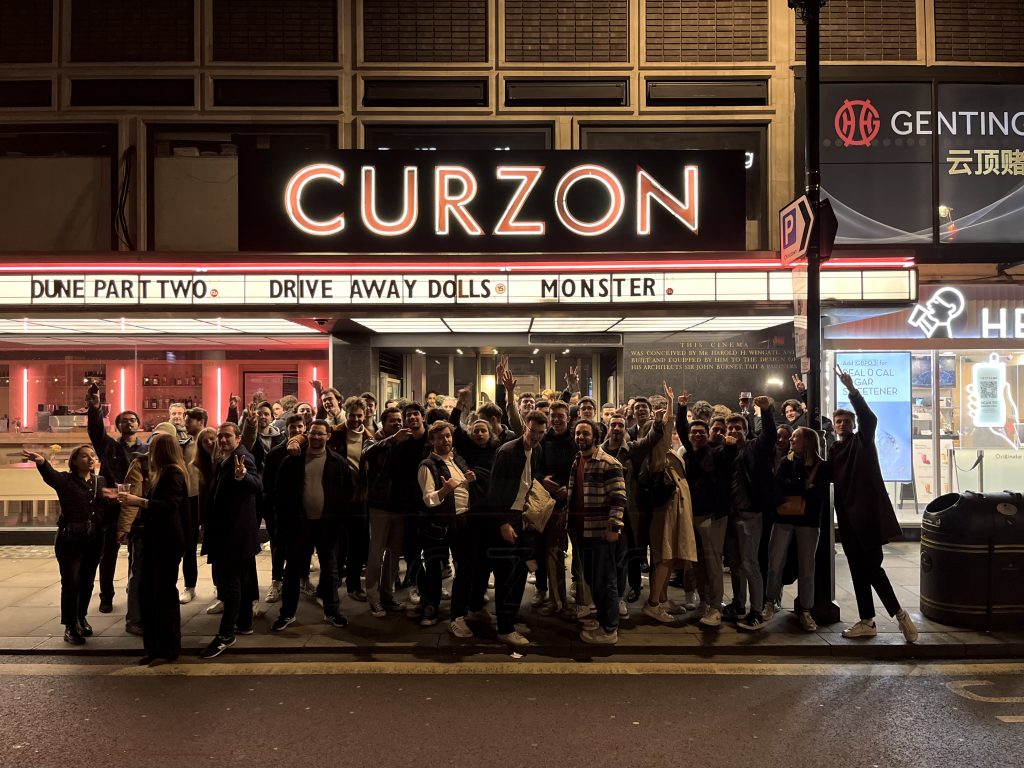
The Launchpad participants in front of the Curzon cinema in Soho, London, where the Grand Pitch Night 2024 took place. ©Thiago Penteado
While not everyone is at the stage of this one-of-a-kind trial, six projects have been selected for a presentation in front of venture capitalists during an evening at a prestigious downtown London cinema. Some have already signed clients, gathered an online community or designed their product.
Psychology, theater : A top-notch training
During this four-day learning expedition abroad, students undergo preparation at the HEC UK House, around Covent Garden. On the agenda: many meetings with entrepreneurs but also psychology classes to solve problems between associates with psychologist Nikita Mikhailov, accustomed to sessions with financiers working in the City. The group gathered around a carpet stamped with keywords representing personality traits. “An introvert is an extrovert with good taste!” their tutor jokes. Authoritarians, extroverts, tough or demonstrative leaders seem to be highly disliked traits. “We realized that some of the problems encountered by founders can be related to personality,” whispers Delphine Mourot, the director of the HEC office in the UK, who supervised the activities with her team. Poor communication, conflicts… Some issues could be preempted if they knew each other or their co-founders better.”
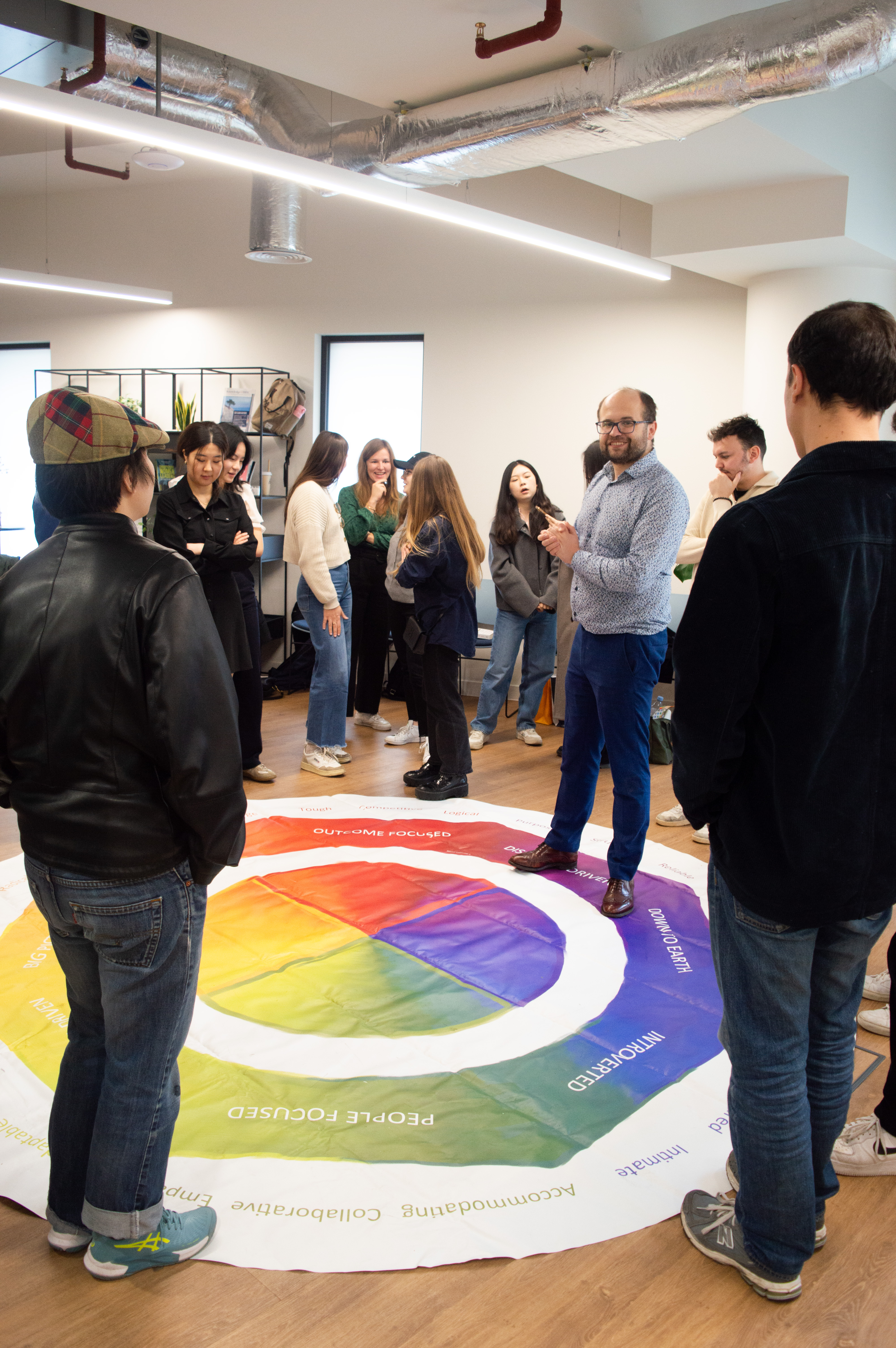
In the next room, another group attended a storytelling masterclass with charismatic former actor and expert in public speaking Stewart Bewley. After psychology, it’s time for emotion. “The brain processes 90% of information in pictures,” he states to his students, before making them reflect on their personal trajectory, hide in a corner of the room, practice on the floor… or on their knees. A highly entertaining workshop for a spectator’s eye and whose goal is to learn how to retain the audience’s attention with confidence.
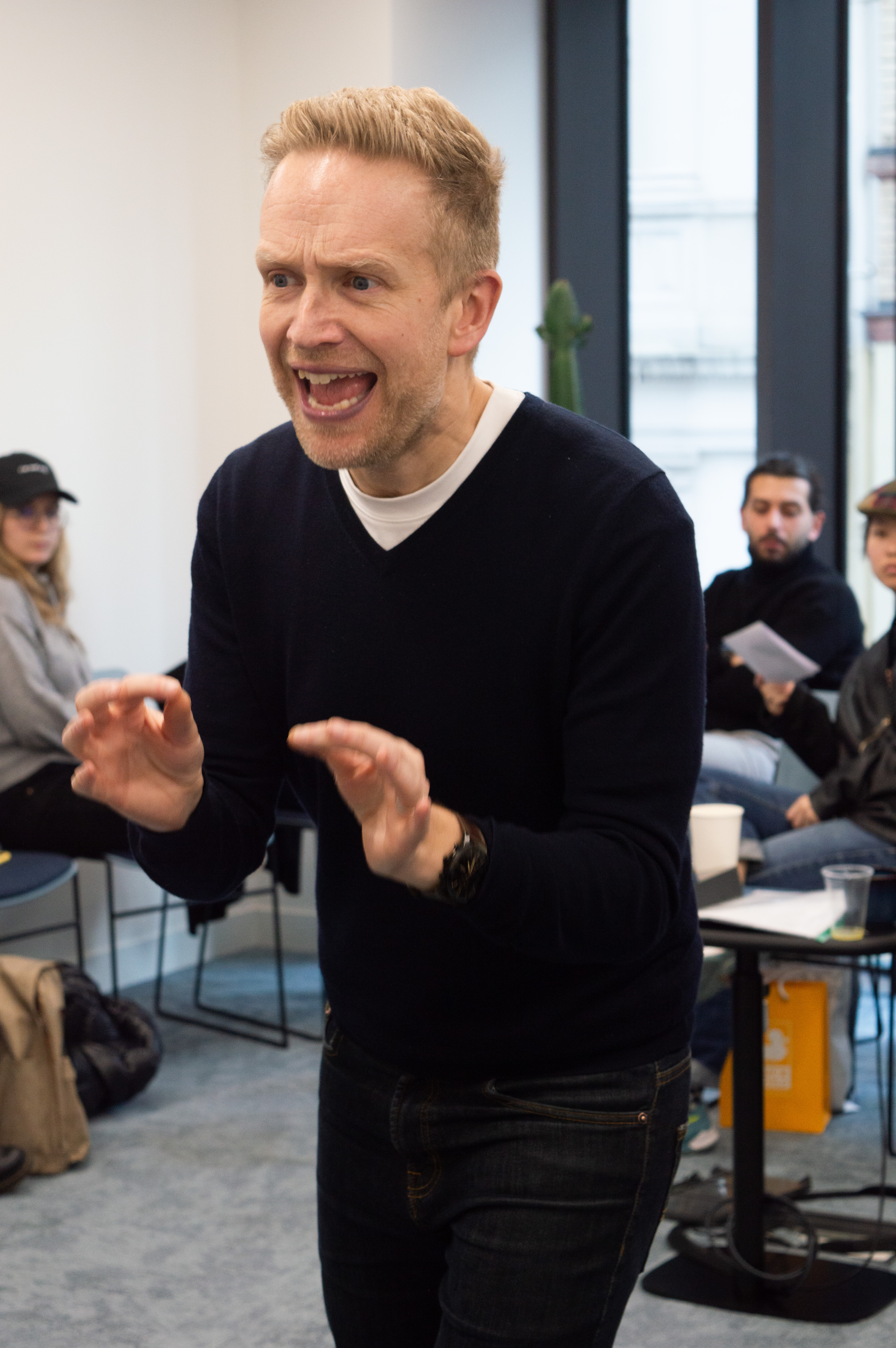
« We check if they’re asking the right questions »
On what criteria were the startups chosen to pitch tonight? Half of them involve AI. A trendy term? “AI is indeed a buzzword. It can mean everything and nothing. Its application is important,” says the Launchpad director and co-founder of Lingueo, Guillaume Le Dieu de Ville (M.06). Projects are determined by trends related to the students’ environment, technical trends, and current macroeconomic contexts.”
To select students for the program, the jury first tests their knowledge of a market and its associated problematics. We check if they’re asking the right questions. Once in the program, they go on the field,” says Guillaume Le Dieu de Ville. “We give them the tools to validate their assumptions and analyze the entire value chain. We encourage them to define their environment to succeed more easily rather than relying solely on intuition and struggling for 6 years, which happens regularly.”
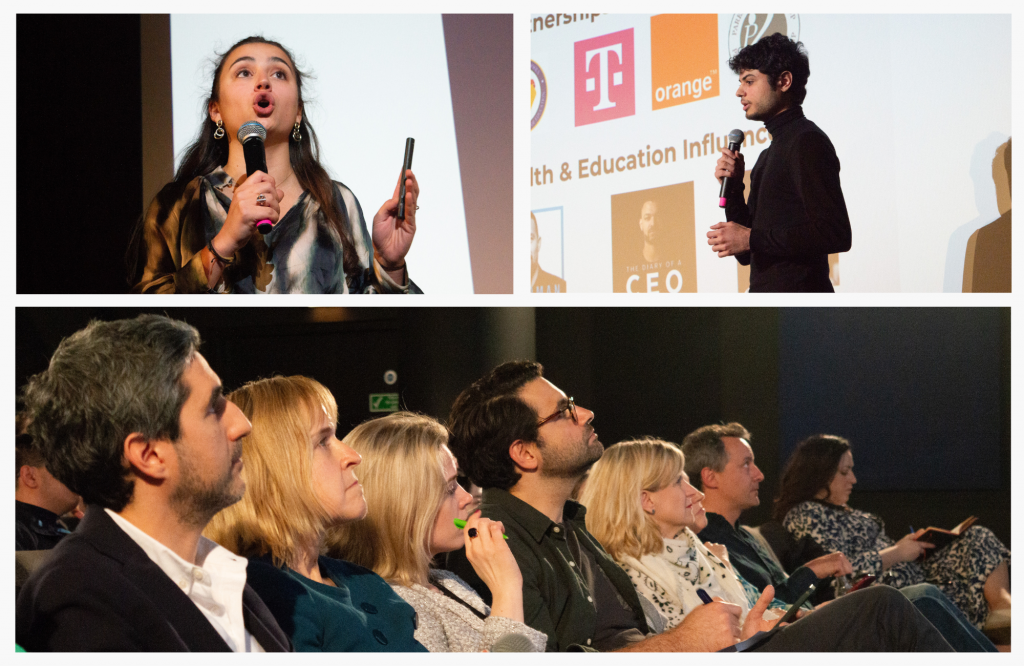
Top, from left to right: Tidora Rifaï from the Rebalance team, Wadih Sfeir from the Brightly project. Bottom, from left to right: Adrien Cohen, Maryline Kulawik, Gabriele Papievyte, Ramzi Rafih, Inge Kerkloh-Devif, and Guillaume Le Dieu de Ville. ©Estel Plagué/HECStories
One problem, one solution. And the startup projects preparing to pitch are mostly solutions for businesses. “We have more than 50% of B2B projects. The school’s environment, our corporate partners, and a certain access to companies favor this,” explains the program director. Since its creation, the course has brought to life more than 300 startups, of which 125 still exist.
LLM, HR, CRM…
Technical trends now clearly are about simplifying tasks and tedious processes for workers. Three selected projects put AI at the heart of their solution and target a very specific sector and issue. AmonAI relies on an LLM (Large language model) – a model that can assimilate and use large volumes of data to generate content – to structure data and simplify internal procedures in the very traditional field of construction. Bluco is developing a chatbot system on instant messaging apps and the automation of CV screening to help companies recruit in sectors experiencing shortage, like health. Eledone works to simplify the use of complex company software like Sage through an LLM and symbolic AI.
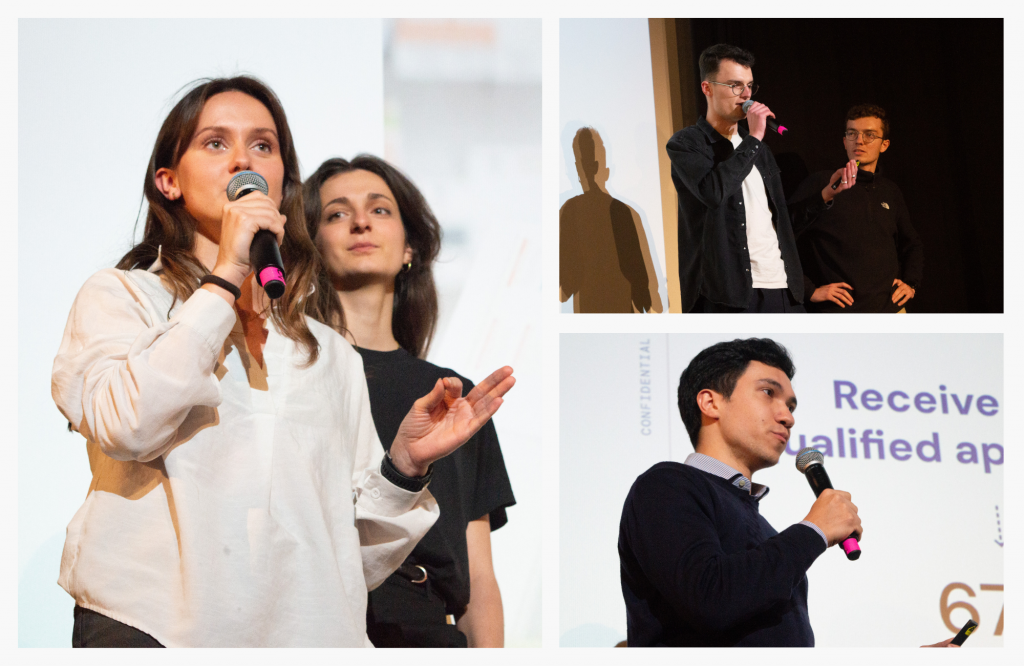
Laura Da Costa and Élise Budin from the Uzu project, Arno Heckel and Bruno Heckel from the Eledone project, Francisco Shirazi de Latour from the Bluco project. ©Estel Plagué/HECStories
The unique circular economy project is Rebalance. It aims at bridging the gap between companies and non-profits to distribute their unsold stocks as donations, with a tax deduction as a bonus. Only Brightly targets the general public and aims to combat social media addiction among children through its application with a system of limitations and compromises: two hours of educational content for five minutes of TikTok. On the marketing side, Uzu offers pharmacists and their partner brands access to consumer data through a loyalty program on their app and an online community. How will they all manage their pitch?
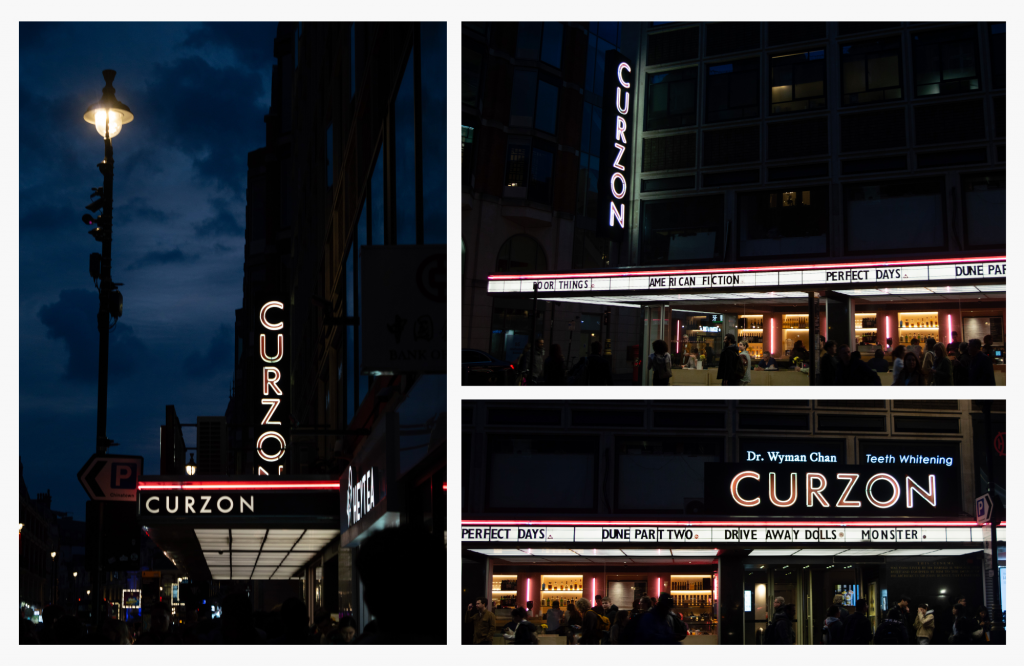
The Curzon cinema at nightfall, Shaftesbury Avenue, Soho, London. ©Estel Plagué/HECStories
A show à la Shark Tank
At 6:30 pm, night falls on London and the Curzon cinema stands out in the darkness with its light pink neon. Showing tonight: Dune, Part Two… In the lower second floor, the Launchpad is about to start and the now nervous students articulate their pitch in English one last time. The room slowly fills up at the sound of teaser video presentations filmed by the participants and projected on a large screen. Spectators are invited to vote online for their favorite, like at Eurovision. The event is also broadcasted live on YouTube. Delphine Mourot kicked off the show alongside Guillaume Le Dieu de Ville and Inge Kerkloh-Devif, director of the HEC Innovation & Entrepreneurship Institute, which oversees the Launchpad and the HEC Station F incubator, among others.
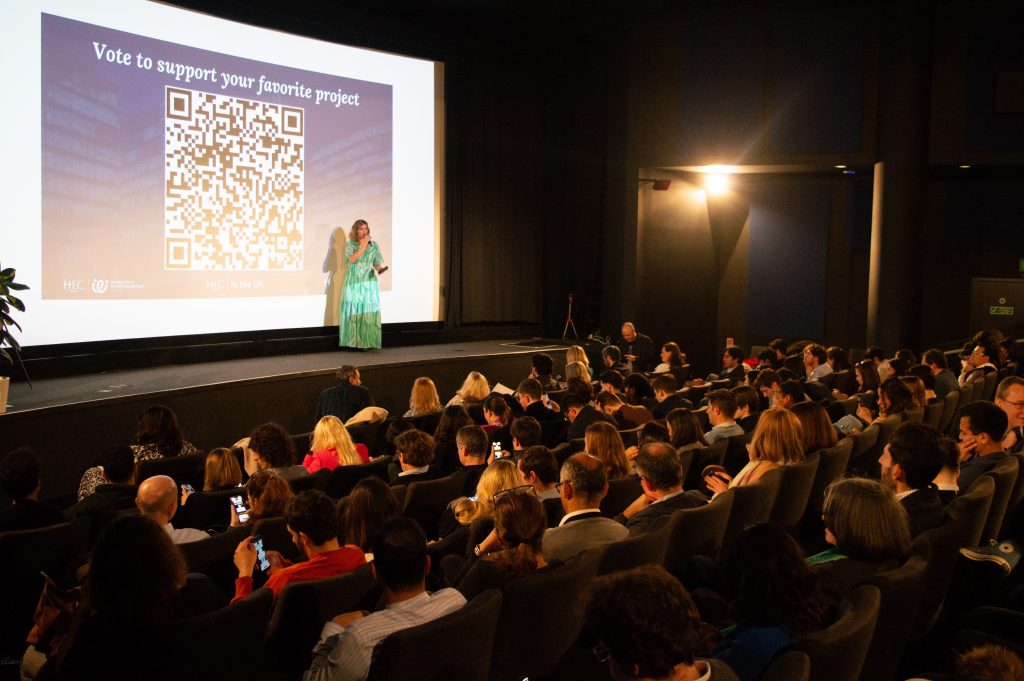
HEC Paris UK Office Director Delphine Mourot introducing the pitch night at Curzon Cinema, London. ©Estel Plagué/HECStories
The six teams take turns on stage, competing with numbers, keywords, slogans, and trying to inject as much dynamism as possible into their speech. In the front row, the jury consists of entrepreneur Adrien Cohen (H. 08) and VCs Gabriele Papievyte from XTX Markets, Maryline Kulawik (H.94) from Spice Capital, and Ramzi Rafih (H. 09), founder of No Label Ventures. They engage in the exercise of honest criticism. “- What is your selling point in such a competitive market?” asks Ramzi. “- I advise you get more real-life experience. I can feel something inconsistent here,” Adrien proclaims. After a quick deliberation in a small adjoining room, AmonIA is announced as the winner of the jury prize. The Bucco team, on the other hand, wins the prize of the audience. As Adrien Cohen puts it: “A vertical AI within a not-so-sexy vertical is the way to go !”
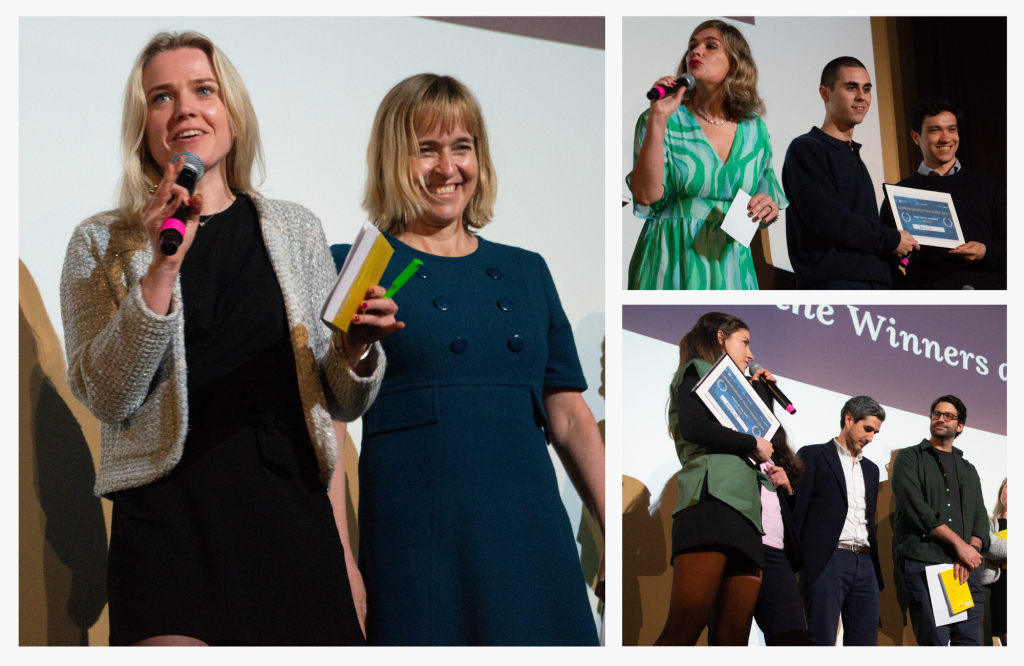
To the left: Gabriele Papievyte and Maryline Kulawik announcing the winners. Top: Delphine Mourot and the winners of the Audience Award, Nicolò Magnante and Francisco Shirazi De Latour. Bottom: one of the winners of the Jury Prize for her project Amon AI, Léonie Mathian, alongside Adrien Cohen and Ramzi Rafih. ©Estel Plagué/HECStories
A good dynamic among project members is a criteria highly regarded by this night’s jury, who is eulogistic about the winners. “What a charming team!” exclaims Gabriele Papievyte. “We look at the complementarity of talents. My favorite was the deeptech Eldone, but in terms of team, it was AmonAI,” says Maryline Kulawik during the cocktail party. There was still a discussion about the fact that being in a niche market also allowed for increased margins and less competitive intensity.” Investor Ramzi Rafih confirms that the jury unanimously converged on this solution that allows obtaining any key data from a construction site by asking an AI. “A slightly less crowded market with high potential.”
AmonIA member Naima Tijani, a student in the X-HEC Entrepreneur master’s program, says she is “extremely happy that the idea is well received. It’s really a subject that is close to my heart.” During the first weeks of the Launchpad, she was able to visit the construction site of the Olympic swimming pool in Saint-Denis, next to Paris. Her background led her team to victory as she started her career in the construction field. “I worked in the US for three years, but I got fed up with construction, it was tough!” Her startup project targets a market supposedly worth “12 trillion dollars”. She plans on refining her tech product with site managers before moving on to “the blitzkrieg method” to flood the market.
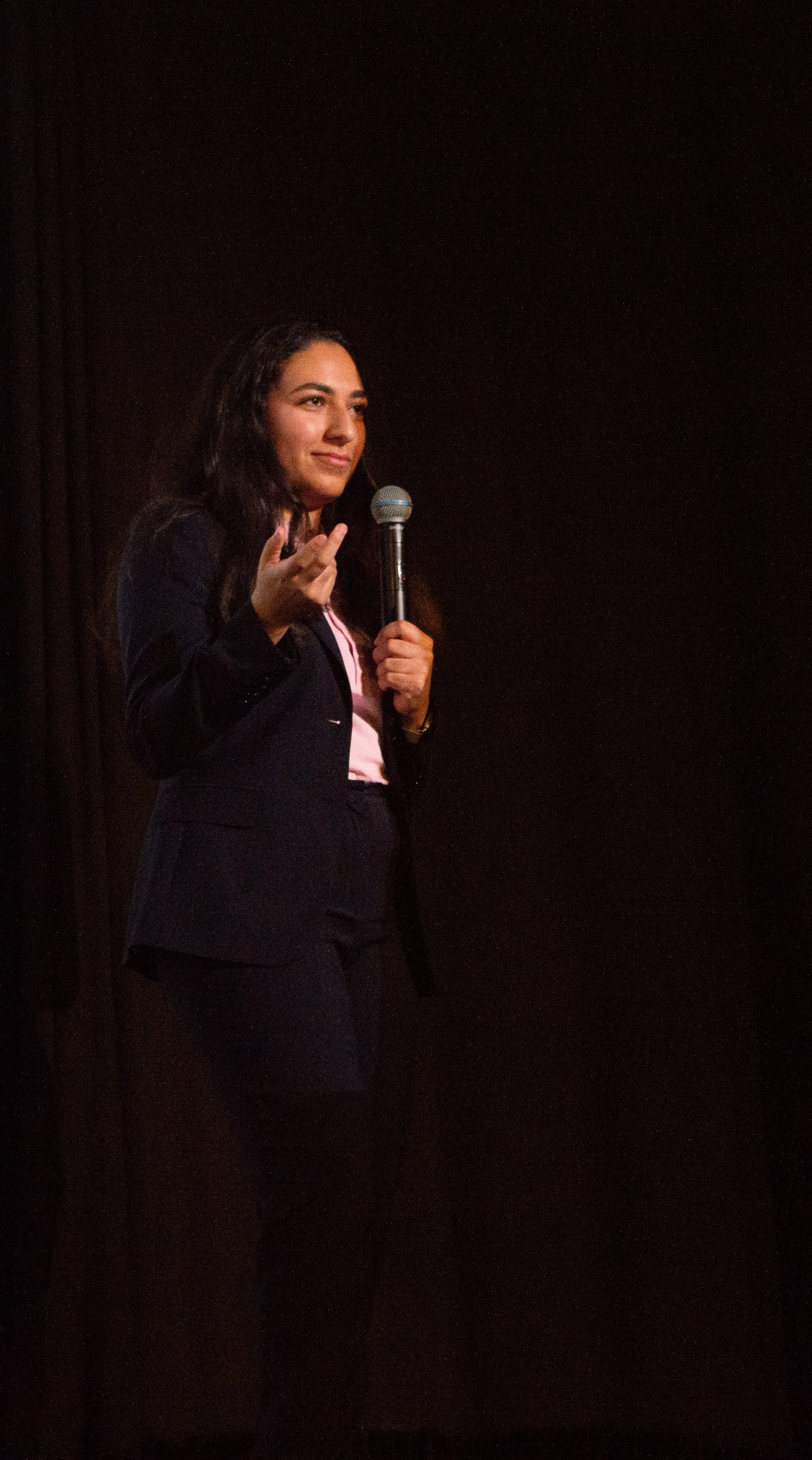
The duo behind Bluco, winners of the audience award, already have their solution tested by two companies. They claim to have worked “fourteen hours a day, seven days a week. We plan to register the company and launch sales in a few weeks,” says Francisco Shirazi de Latour, alongside his partner Nicolò Magnante. Their product will be live in a few days. Definitely on the launching ramp.
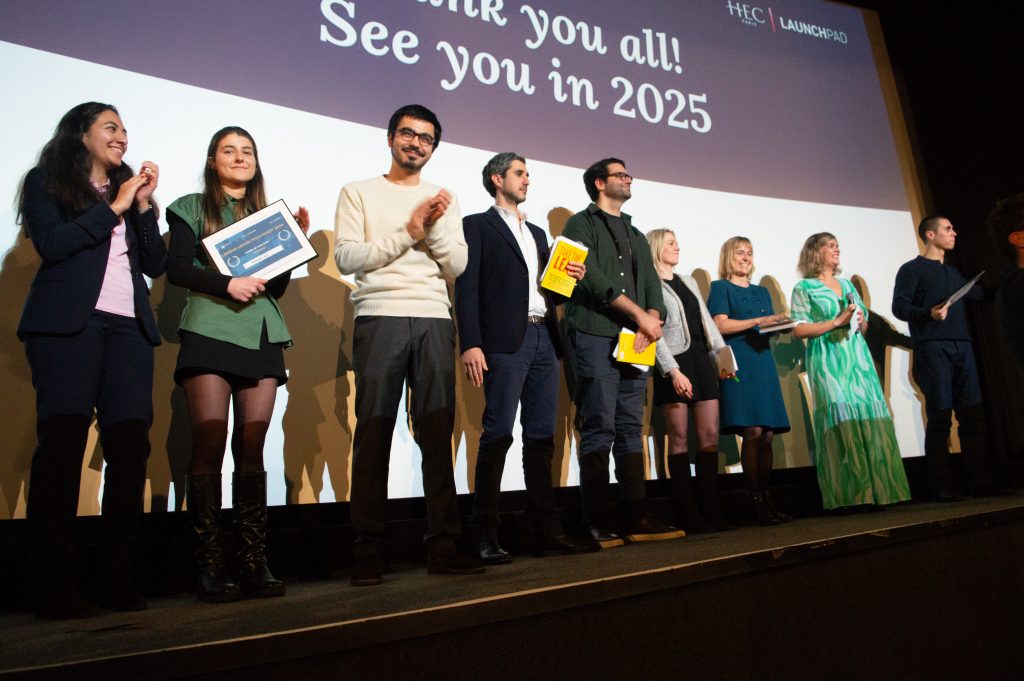
From left to right: the Amon AI team, Naima Tijani, Léonie Mathian, Alexis Moret, the jury members Adrien Cohen, Ramzi Rafih, Gabriele Papievyte, Maryline Kulawik, HEC Paris UK office director Delphine Mourot, the Bluco Nicolò team Magnante and (out of frame) Francisco Shirazi De Latour. ©Estel Plagué/HECStories
To relive the evening and listen to the pitches, click here:
Published by Estel Plagué

